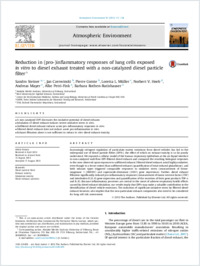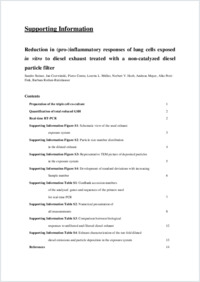Reduction in (pro-)inflammatory responses of lung cells exposed in vitro to diesel exhaust treated with a non-catalyzed diesel particle filter
- Steiner, Sandro Adolphe Merkle Institute, University of Fribourg, Switzerland
- Czerwinski, Jan Bern University for Applied Sciences, Switzerland
- Comte, Pierre Bern University for Applied Sciences, Switzerland
- Müller, Loretta L. Center for Environmental Medicine, Asthma and Lung Biology, University of North Carolina at Chapel Hill, USA
- Heeb, Norbert V. EMPA, Swiss Federal Laboratories for Materials Testing and Research, Switzerland
- Mayer, Andreas TTM, Technik Thermischer Maschinen, Switzerland
- Petri-Fink, Alke Adolphe Merkle Institute, University of Fribourg, Switzerland
- Rothen-Rutishauser, Barbara Adolphe Merkle Institute, University of Fribourg, Switzerland
-
01.12.2013
Published in:
- Atmospheric Environment. - 2013, vol. 81, p. 117–124
English
Increasingly stringent regulation of particulate matter emissions from diesel vehicles has led to the widespread use of diesel particle filters (DPFs), the effect of which on exhaust toxicity is so far poorly understood. We exposed a cellular model of the human respiratory epithelium at the air-liquid interface to non-catalyzed wall-flow DPF-filtered diesel exhaust and compared the resulting biological responses to the ones observed upon exposure to unfiltered exhaust. Filtered diesel exhaust acted highly oxidative, even though to a lesser extent than unfiltered exhaust (quantification of total reduced glutathione), and both exhaust types triggered comparable responses to oxidative stress (measurement of heme-oxygenase 1 (HMOX1) and superoxide-dismutase (SOD1) gene expression). Further, diesel exhaust filtration significantly reduced pro-inflammatory responses (measurement of tumor necrosis factor (TNF) and interleukin-8 (IL-8) gene expression and quantification of the secretion of their gene products TNF-α and IL-8). Because inflammatory processes are central to the onset of adverse respiratory health effects caused by diesel exhaust inhalation, our results imply that DPFs may make a valuable contribution to the detoxification of diesel vehicle emissions. The induction of significant oxidative stress by filtered diesel exhaust however, also implies that the non-particulate exhaust components also need to be considered for lung cell risk assessment.
- Faculty
- Faculté des sciences et de médecine
- Department
- Département de Chimie
- Language
-
- English
- Classification
- Chemistry
- License
-
License undefined
- Identifiers
-
- RERO DOC 209304
- DOI 10.1016/j.atmosenv.2013.08.029
- Persistent URL
- https://folia.unifr.ch/unifr/documents/303406
Other files
Statistics
Document views: 115
File downloads:
- pdf: 155
- Supplementary material: 104

